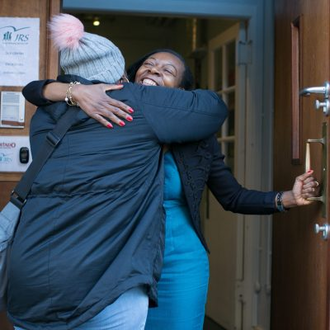JRS report calls for communities of hospitality, end to hostile asylum policies

A new report finds that asylum seekers in destitution and detention feel dehumanised by the asylum system but find strength through community membership, faith and volunteering. The Jesuit Refugee Service (JRS) UK has responded by calling for an end to hostile environment policies and for the development of policies and social action focused foster community, hospitality and participation.
The report, For our welfare and not for our harm by leading Catholic theologian, Dr Anna Rowlands, analyses barriers to justice and dignity faced by destitute and detained asylum seekers from their own perspectives. It draws on interviews with asylum seekers at JRS UK who have struggled to gain recognition as refugees and been destitute for years, many of whom have also experienced detention; it also draws on interviews with JRS UK staff and volunteers.
Refugees described the asylum system as one that "wastes time, skill, capacity and promise", and makes them "feel worthless" and "like rubbish". Some spoke of feeling as if they were "degrading in time" as they struggled with enforced destitution and idleness caused by the ban on being allowed to work. Others spoke about the traumatic impact of detention that continued to affect their lives, sometimes many years later. By contrast, refugees were clear about what they wanted to change, arguing for a more humane asylum system, with opportunities to work and participate in community.
Sarah Teather, Director of JRS UK, said: "This report lays bare an asylum system which erodes human dignity and wastes lives. It demonstrates the urgent need to end the hostile environment agenda and invest in a more humane approach, enabling people to work and participate in community. This requires deep, systemic transformation."
The report also highlights the importance of faith for maintaining and recovering agency and sense of self for many in the asylum process. It further explores the faith-basis of JRS and the particular way faith shapes their ethos of accompaniment and the importance of fostering participative community.
Dr Anna Rowlands said: "Again and again refugees I interviewed told me about the importance of faith as a source of meaning, story, identity and resilience. But critically, refugees were makers of religious meaning and leaders of faith communities, not merely beneficiaries of well-meaning faith-based care and social action."
Refugees spoke powerfully of the importance to them of finding spaces where they can be active, assist and bring comfort to others, enlarge their own worldview through encountering the experience of others, and enable mutual perseverance.
The research finds that asylum seekers involved with JRS UK particularly valued simple human aspects of the organisation's practice, such as the way staff, volunteers and refugees eat meals at the same table, and the way refugees are greeted at the Centre by name. They spoke of the importance of finding spaces like JRS UK where they could volunteer and have their skills recognised and give support to others "using time in a fruitful way".
Sarah Teather, Director of JRS UK, said of the collaboration between JRS UK and Dr Anna Rowlands: "This research has deepened our understanding of refugees' experience of the asylum process, exposing the pain of prolonged destitution in the asylum system, but has also given voice to the highly perceptive analysis of refugees themselves.
"We are particularly grateful for the insights this research has provided about the factors that give refugees strength and sense of agency. There were some surprises. We didn't expect to find that eating together at the same table was so valued. This habit of shared meals each day has grown unselfconsciously out of our ethos of community and mutuality over many years. The research has enabled us to reflect on our own practice as a small faith-based organisation, deepen our commitment to our mission to accompany refugees."
Dr Rowlands said "… I was delighted to be invited to collaborate with JRS UK. JRS is doing vital work in attempting to create a space in which refugees are viewed not as hostile presences, nor merely recipients or guests of well-meaning others but dignified agents who want a space not only to survive and receive support but to engage in all the things that make us properly human. This is work not just of care but also of resistance and deep creativity in an often hostile and limited system.
The report: For our welfare and not for our harm: a faith-based report on the experience of the refugee and refugee support community at JRS UK 2017-2019' is available at www.jrsuk.net


















